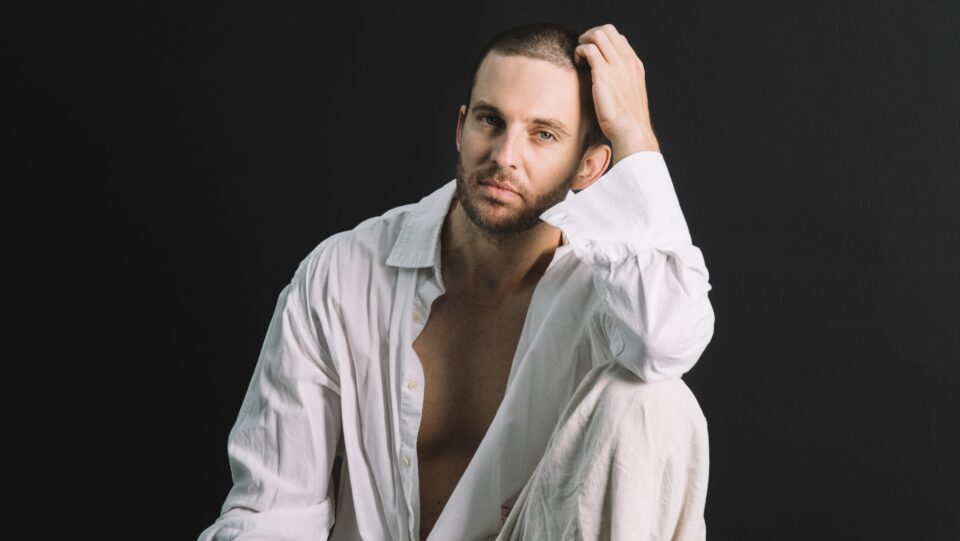‘Min-ho and Hyo-jin Are Especially Dear to Me’: Alex Hafner Shares Experiences of Working in ‘When the Stars Gossip’
The Spanish/American actor recounts the strong sense of teamwork, camaraderie, and transformative experiences he’s had while working on the K-drama

"K-dramas have a layer of fantasy beneath their grounded stories, which makes them incredibly relatable. I certainly wouldn’t mind doing another one!"—Alex Hafner. Photo: Jinny Park
Alex Hafner plays astronaut Santiago Gonzalez Garcia in the K-drama When the Stars Gossip, alongside Lee Min-ho, Gong Hyo-jin, Oh Jung-se, and other Korean actors. In this interview, Hafner shares details about it, emphasizing how the venture helped him find a newfound space of happiness and lifelong memories.
In the series, Santiago’s “larger-than-life” presence and outward confidence belie a deeply personal struggle with his sense of masculinity, which is why he’s on this space research mission. Hafner reveals that this narrative arc has been a unique experience, specifically because playing an astronaut has always been a role he wanted to play, and Santiago made it possible for him while also allowing him to challenge himself, travel, and be a part of something new. “It felt like a perfect alignment of character and personal growth—manifesting destiny for both Santiago and me,” Hafner reflects, underscoring the impact the role has had on him.
The actor’s experience in When the Stars Gossip could make an engaging narrative in and of itself. From how he got roped into the project to filming and sharing fun and thoughtful moments on and off the sets, his time has been not just of the challenges and joys of navigating a cultural and linguistic landscape different from his own but also a transformative experience. He recounts with evident delight the moments of bonding with his co-stars, especially Lee Min-ho and Gong Hyo-jin, who organized a memorable dinner for the space team. “We ended the night with karaoke, which was hilarious,” he says, adding, “I jokingly claim I’m the best singer in the group, but the truth is, their thoughtfulness touched my heart.”
These moments of shared joy and the forging of new friendships have been a significant part of Hafner’s journey while working on the K-drama. And like him, his character Santiago, too, undergoes a transformative arc, as he realizes that the answers he has been seeking may have been right in front of him all along. Hafner’s portrayal of the character delves into the complexities of Santiago’s inner conflicts and the ultimately liberating journey of self-discovery. “I hope audiences connect with his vulnerability and his growth.”
****
Please tell me about your initial reaction to being offered the role of Santiago. What drew you to this character?
I was ecstatic—I literally jumped on the bed like a five-year-old! I was in Lake Como with a friend on a foodie birthday trip when I got the call to tape a scene by the next day. These opportunities always seem to come at the most inconvenient times, but that’s part of their magic.
I was sent excerpts from the first four episodes, and I chose a scene in which Santi and Seung-jun invite Mr. Gong into their drinking ritual. It felt like the perfect moment to showcase the character’s playful side without overthinking technical precision—it’s a drunken scene, after all! The real challenge was finding the right spot to film. We even moved a massive painting in the house we were staying at to create a blank wall with good lighting.
Thankfully, it all worked out, and I never imagined that moment would be so life-changing. Playing an astronaut has always been a dream of mine, and this role allowed me to push myself, travel, and immerse myself in a new culture. It felt like a perfect alignment of character and personal growth—manifesting destiny for both Santiago and me.
What preparation did you undertake for the portrayal, especially in terms of Santiago’s experiences in a spaceship? How was it working with director Park Shin-woo?
Director Park recommended the NASA docuseries Among the Stars, which gave me a great foundation for understanding astronaut missions. From there, I dug into diagrams of the ISS and studied routines astronauts rehearse on Earth, especially in zero-gravity simulations. Finding parallels between their work and acting helped me internalize the technical aspects naturally.
To make the set feel familiar, I put up photos of astronauts and the space station all over my apartment. The bigger challenge was mastering the constant, redundant communication astronauts rely on. It’s vital in space, but making it sound natural took a lot of rehearsal.
Director Park was incredible—he studied in Spain and even completed the Camino de Santiago. His deep understanding of my character’s spiritual and physical journey was inspiring, as it is a central theme to the series. Santiago’s larger-than-life persona hides insecurities about his masculinity (his crooked sperm condition), and Director Park helped me balance those complexities beautifully.
What was it like working alongside Lee Min-ho, Gong Hyo-jin, and the rest of the Korean cast?
They’re all lovely people. In fact, I’m learning Korean now because I enjoyed the experience so much. Min-ho and Hyo-jin are especially dear to me because we spent the first two months in close confinement on the G.O. 10 set (based on the Soyuz rocket). Nothing tests chemistry like being in tight quarters, and I’m so happy we vibed well with each other.
Everyone was open to rehearsing together and visiting each other’s trailers during downtime. We also went out as a group on holidays or for meals. I think our camaraderie translates on screen, which is especially important since Santiago is such a well-liked and respected character.
When I was in Seoul last November for ADR, Min-ho and Hyo-jin organized a fun dinner with the space team. We ended the night with karaoke, which was hilarious. I jokingly claim I’m the best singer in the group, but the truth is, their thoughtfulness touched my heart.

Please share a behind-the-scenes anecdote. What was the vibe like on set and among the cast and crew?
Before this, I didn’t know about the fan-sponsored coffee and food truck culture on Korean sets—it’s such a warm, thoughtful tradition. I even collected stickers from each one and now have a little book as a quirky keepsake.
One day stands out, just before the holiday break: It was for a scene with all the characters of the series in the same space—around 20 actors. The set was packed because, in Korea, each actor has their own makeup team, stylist, and assistants – not to mention the set crew. Between that and all the coffee and food trucks, it felt like a nightclub inside and a Christmas market outside. I remember thinking, “Am I in Paju, or am I waiting in line at Berghain?”
With over 200 people on the soundstage, the director had to use a megaphone to cut through the noise. It was chaotic, but the kind of chaos that hums with excitement. Afterward, we all went out for BBQ and soju to unwind—a perfect end to a memorable day.
What was your approach to mastering the technical jargon and physicality required for playing an astronaut?
To me, understanding the function behind the jargon was key. If I could visualize what I was saying, I could remember it. Movement was just as important. Mimicking zero gravity required retraining my body—every movement, from sitting to reaching, had to feel weightless: nothing could be erratic.
Physical fitness was essential. Spending hours on wires or harnesses was exhausting, especially after dinner. Staying in shape helped me recover quickly and stay focused. Having So-yeon Yi, Korea’s first astronaut, on set was invaluable. Her insights into the mental and physical challenges of space travel gave me a deeper understanding of the role.
Considering the unique setting of this K-drama, what are your thoughts on the special effects and CGI used to create the spaceship environment?
The CGI looks fantastic because it’s deeply grounded in reality. The art department built incredibly detailed replicas of the space station across four soundstages, blending practical and visual effects seamlessly. This combination made it easy for us to immerse ourselves fully in the environment.
The Soyuz set, for example, physically shook during the launch scenes, adding to the authenticity. Shots like the suit-satellite collision were composed with incredible precision, using robotic cranes to create continuous, dynamic movements.
Director Park was meticulous about avoiding anything “cheesy,” except in deliberate moments of satire or parody. The overall look strikes a perfect balance between realism in space and surrealism on land. At times, it feels intentionally kitschy; other times, it’s like watching something captured with a 360-degree camera. The result is visually stimulating and full of character, I love it!
Did you connect personally with the themes of isolation and exploration while preparing for or playing Santiago?
Yes, deeply. The set was an hour away from my apartment, and prolonged COVID restrictions at the time limited social interactions. Long shooting hours, combined with the solitary nature of certain scenes, often heightened feelings of isolation. Shooting in the space station set added to this sense of loneliness, as everything was communicated through radios and filmed using cranes or steady cams with long lenses. Even the boom operator was out of sight, typically stationed on scaffolding above the module we were shooting in.
As an extrovert, this environment was challenging, but I found solace in meditation and maintaining healthy routines. Practices like cold showers and morning sunlight exposure helped me process and channel those emotions constructively, as well as communicating what I felt (even if it was just to myself) proved useful—much like Santiago does in the story.
What are your thoughts on the popularity of K-dramas, especially now that you’ve been part of one?
Korean culture’s emphasis on subtlety shines in its dramas. There’s a balance between understated gestures and bold aspirations that feel universal. K-dramas have a layer of fantasy beneath their grounded stories, which makes them incredibly relatable. I certainly wouldn’t mind doing another one!
Looking ahead, what are your aspirations as an actor?
I dream of winning an Oscar for a leading performance—it symbolizes the pursuit of truth and excellence in storytelling, which is what I strive for as an actor. I’m drawn to characters who face profound personal challenges, whether in historical dramas, futuristic worlds, or grounded, nature-connected stories. At the same time, I’d love to work on something romantic—stories that inspire connection and intimacy, which feel increasingly vital in a world where these values sometimes seem to be slipping away.
I also have a deep passion for working in different languages and cultures. Every project is an opportunity to grow, not just as an actor but as a person. This profession has given me the chance to cultivate a wide array of skills and hobbies I might never have pursued otherwise, and for that, I’m incredibly grateful. I’m excited to see where this journey takes me and the stories that come my way.

What do you hope audiences take away from your portrayal of Santiago and the story?
Santiago’s journey is about realizing that what you’re searching for may already be right in front of you. He begins by chasing a deeply personal dream, convinced that space holds the answers he’s looking for. But as the story unfolds, he discovers his “space family” might be the family he’s been longing for. It’s a reminder that in pursuing the distant, we often overlook what’s right here.
There’s also an irony in his story that reflects our world today—sometimes it feels like we’re so focused on leaving this planet that we forget to value the life Earth already offers.
I hope audiences connect with his vulnerability and his growth. His story is a reminder to appreciate what we have before chasing something out of sight.



